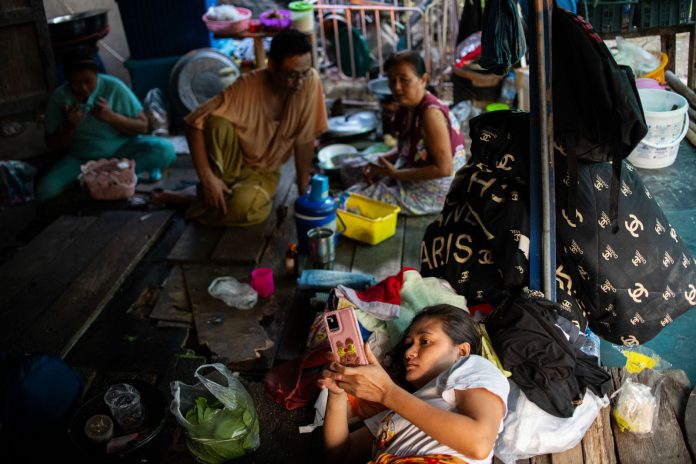For migrant women in Thailand, the right to an abortion is enshrined in law – but often still out of reach in reality. A word-of-mouth network of community volunteers is striving to bridge the gap between legal rights and practical access.
Story by Nicha Wachpanich
Photos by Shwe Paw Mya Tin
In a cramped rented room, where the distance from the door to the opposite wall is a mere five steps, Ma Mi Mi and her husband have carefully arranged all their belongings in a foreign land. A bedsheet, tucked into a corner, serves as their nightly resting place near a small picnic gas stove. Against the wall, beneath a poster of the Buddha, a baby crib sits – a new addition to their tightly packed home.
Ma Mi Mi (not her real name) eagerly prepares for the birth of her third child. But just a year ago, she faced a starkly different reality: the difficult decision to terminate her pregnancy.
“I didn’t really want to do it. I was scared, and it was my child,” said the 32-year-old, who hails from Mon state in southern Myanmar. “But we were in debt, and I desperately needed the money to renew my passport.”
Ma Mi Mi is one of many migrant workers striving to make a living in Mahachai, an industrial town west of Bangkok, often dubbed “New Myanmar.” While working at a fish processing factory, she discovered her pregnancy during a mandatory health check-up for her passport renewal in late 2022.
Unable to afford both another child and the cost of renewing her passport, the mother of two decided to pursue an abortion. Although Thailand legalised abortion up to 20 weeks for all women a few years ago, many migrant workers remain unaware of this right or cannot afford the procedure.
To help migrant women overcome these hurdles, a network of community volunteers in Mahachai is working to bridge the gap between legal rights and practical access. With over 1.4 million female migrant workers of reproductive age in the country, the network believes that sexual health is not an issue to shy away from.
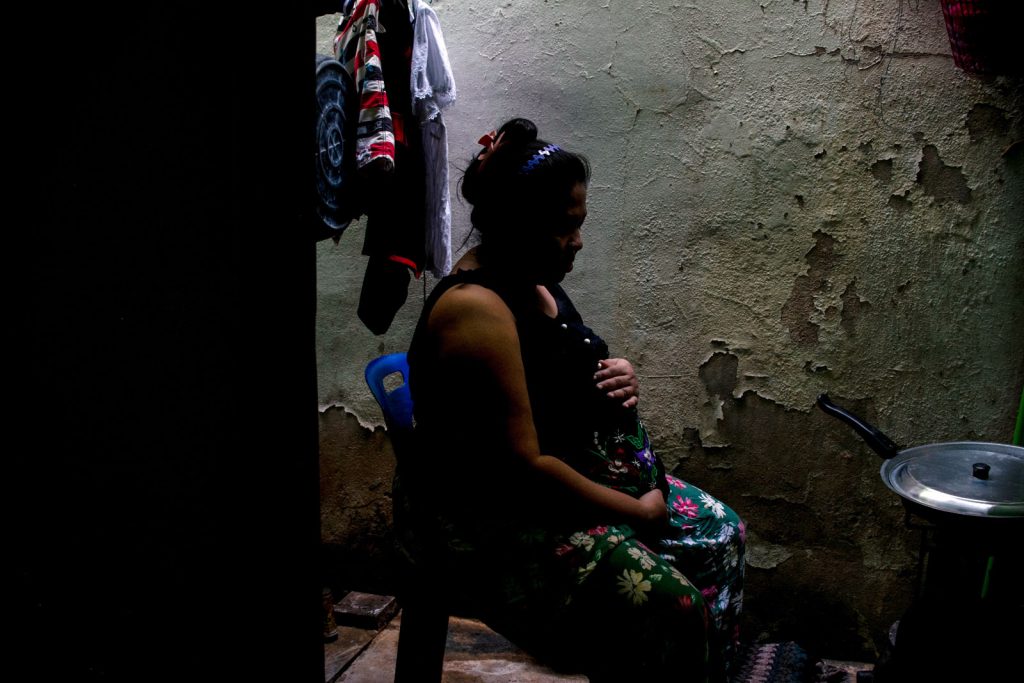
When legal rights don’t guarantee access
Having grown up in Myanmar, where access to abortion is highly restricted, Ma Mi Mi had heard rumours about women attempting self-induced abortions, including risky practices like intense belly massages or inserting sticks which can lead to fatal consequences.
Ma Mi Mi did not want to take the risk, but she was unsure if other options were available until a colleague at the factory told her about safe medical service providers.
This coworker, Naw Wa Wa, volunteers with the Proud Association, a relief group run jointly by Myanmar migrants and Thai locals. Founded by a veteran Thai women rights advocate, the organisation consists of about ten team members and community volunteers, who are often fluent in multiple languages.
The network collaborates with migrant health volunteers (MHV), a programme supported by the Public Health Ministry to provide frontline healthcare to communities of foreign workers. Drawing inspiration from Thailand’s highly successful national village health volunteers (VHV), the MHV was initiated in 2004 to tackle cholera outbreaks in migrant workers’ dormitories.
During the covid outbreak from the end of 2020 to 2022, Proud helped 284 migrant workers in Mahachai to access safe abortion according to their own data and referred the cases to the available service providers. But the group believes the demand for the service is likely even higher as abortion remains a taboo topic in the migrant community and religious beliefs also hinder an open discussion.
“I get a lot of comments from my people – I should not be helping them, it’s not good,” said Naw Wa Wa. As if to highlight her belief that abortion should not be considered taboo, the 38-year-old woman from Kayin (Karen) State wore a pro-abortion t-shirt at a Children’s Day fair in Mahachai, where HaRDstories interviewed her. “But some people are just not ready to be parents.”
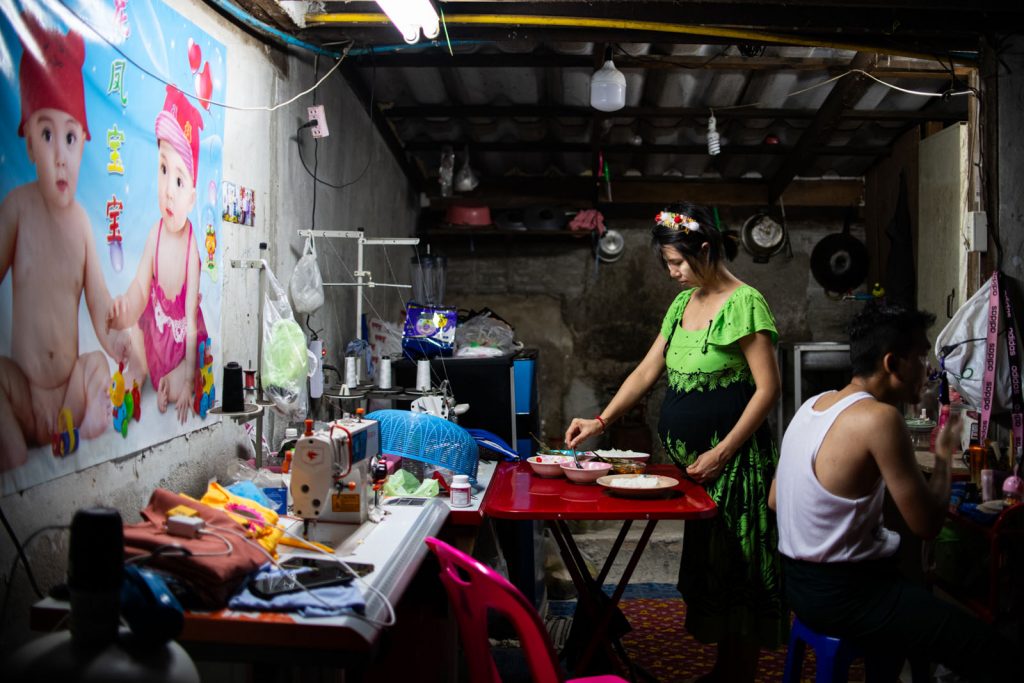
Talking sex education
Talking about sex is already difficult for Ma Mi Mi and other migrant women, let alone discussing abortion. However, when it is communicated as ‘Kowinpyasa’ (Burmese) and ‘Palampor’ (Mon), things become a little easier. That is why migrant volunteers at the Proud Association lead activities in their own languages and empower women to visit the doctor.
“Young people feel embarrassed to talk about sexual health. I used to feel uneasy too at their age, but I’ve now overcome that,” explained Than Tun, a 40-year-old Mon man who volunteers at Proud.
He has been living in Thailand for 26 years and is fluent in four languages. Working alongside Naw Wa Wa, he has helped refer several abortion seekers to available services and subsidising programmes.
“I think that abortion is another necessary healthcare,” Than Tun said.
He recalled learning little about sexual health in schools back in Myanmar. That’s why he chose to conduct sexual education sessions, teaching young migrant workers in his neighbourhood about safe sex and contraception methods.
Often tagging along to these sessions are his two teenage daughters, who attend school in Thailand. Than Tun wants them to learn about these issues and also stay connected with their ethnic community.
Doctor’s dilemma
Mahachai, home to more than 330,000 migrant workers, is no stranger to providing medical care to non-Thai patients. Hospitals have set up special units for migrants with interpreter teams, and prenatal clinics operate with interpreters every week. However, despite being legal, terminating pregnancies is still being done discreetly.
According to Proud, there are currently three hospitals in Samut Sakhon that provide abortion services: two private facilities and a public hospital. However, these hospitals do not openly offer the service, and most procedures happen on a case-by-case basis with the intervention of civil society organisations.
Despite having included abortion in their services since opening, Mahachai’s first walk-in clinic never publicises the service. “It will put off the other customers who seek prenatal care,” explained the young Thai doctor, who asked to remain anonymous for fear of being judged by her peers.
“I choose to provide abortion because I believe it is a woman’s right to make decisions about her body. I don’t want to see cases of unsafe abortion,” she added.
Since opening her clinic in 2022, she has provided two types of abortion services: medical pills (4,000 baht or 109 USD) and tubing machines (6,000 baht or 163 USD), with contraception available upon request afterwards. They usually handle about 30 to 40 cases monthly, and one in four cases involves a foreigner.
Although abortion has become legal in Thailand, the main challenge remains the objection of medical personnel to performing the procedure. Women who seek abortions, regardless of nationality, are often turned away by doctors who are unwilling to perform the procedure or refer them to facilities that are willing to do so.
“I have to say many medical personnel still feel reluctant to do it, but we have conducted some training to promote more understanding and open discussion,” explained Sorachai Lamsakorn, Samut Sakhon’s Vice Provincial Public Health Medical Doctor. Speaking with HaRDstories on the phone, he paused for a few seconds, unsure, before saying the word “abortion” for the first time.
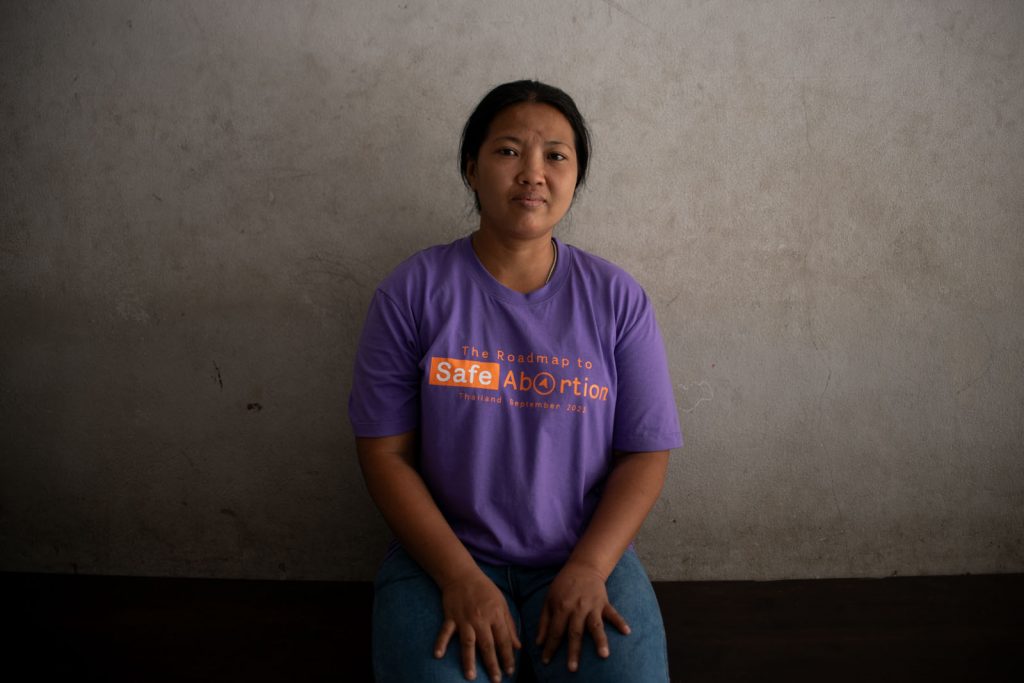
In December 2023, the Samut Sakhon Provincial Public Health Office and Proud Association trained sixty local health officers from different neighbourhoods to become certified advisors for abortion. According to Thai law, women who seek abortion after 12 weeks need to attend advising sessions.
Mananshaya Inklai, co-founder of the Proud Association and a certified abortion advisor, is optimistic that the Mahachai health administration is becoming more accepting of abortion. “Many public health officers still view abortion as morally wrong. I try to encourage them to look at it as part of social and health issues.”
She added that Samut Sakhon has had a high birth rate compared to many provinces over the past decade. At the same time, she still feels a mix of sadness and anger every time she hears news of abandoned children and clinics that provide dodgy abortions.
“Abortion is not the best option, but let the women choose for themselves. Our role is just to give advice,” said Mananshaya, who is also a mother herself.
The high cost of reproductive freedom
But stigma isn’t the only issue women have to overcome. To cover the cost of the abortion, Ma Mi Mi took a loan of 4,000 baht (about 109 USD) with interest to pay for it.
When she was still working at the fish processing factory, she made minimum wage of 360 baht (about 10 USD) daily, making up to 7,200 baht (about 195 USD) monthly. Today, among eleven Southeast Asian countries, only Thailand, Cambodia, and Vietnam allow women to have abortions without stating reasons. Thailand appears to be at the forefront by also including it in public health coverage. Still, the 3,000 baht (about 82 USD) financial support is available only for Thai citizens with universal health care.
Even though Ma Mi Mi was covered by social security, a benefits scheme which allows more than 1.2 million non-Thai workers to be part of, she wouldn’t be reimbursed for her abortion. Up to now, Social Security only covers the cost for miscarriage and abortion with physical or mental risks, basing its criteria on Thailand’s Criminal Code before the amendment in 2020.
“The Social Security Office has taken the issue of including abortion into consideration. Our Medical Service Department Sub-committee had the initial decision in favour theoretically to include this benefit for migrant workers. But we need more time to study about the service providers and the medical cost,” Parichat Chanampai, director of the Central Office for Healthcare Information told HaRDstories in a phone interview.
Abortion at private clinics cost Ma Mi Mi half of her monthly income. For late-term pregnancy, the cost can be even higher. “There are many people who want to do this. It will be great if the service is free.” said Ma Mi Mi.
In the meantime, Social Security partly supports women workers for prenatal check-ups and delivering babies on the basis that the workers pay upfront and get reimbursed after showing the birth certificate.
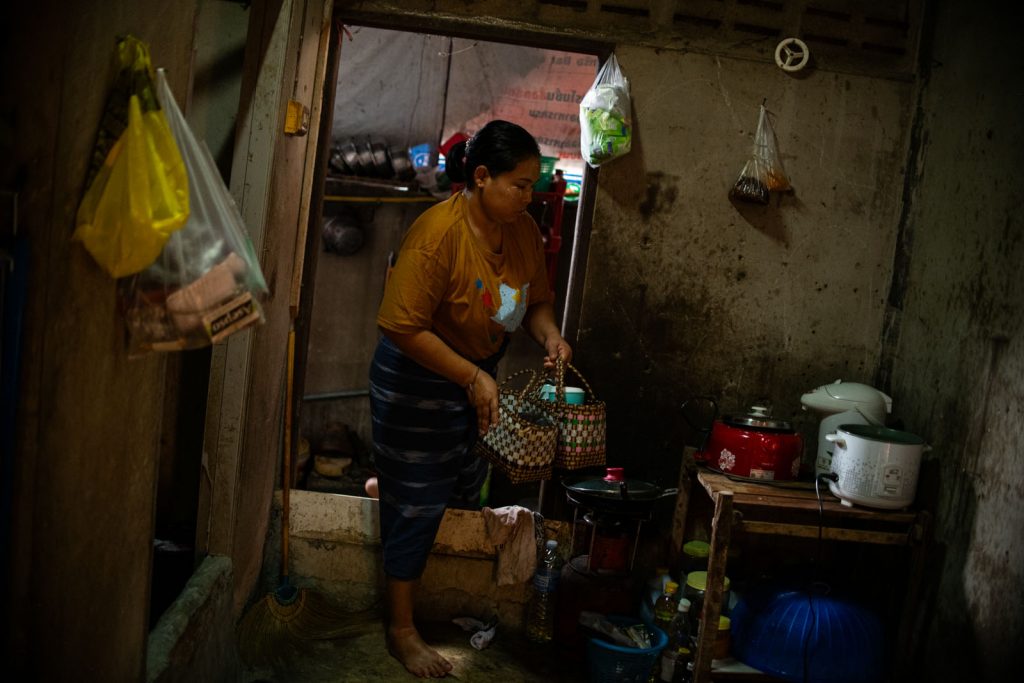
Similarly, the other kind of health insurance available for migrant workers “Migrant Health Insurance” sold by hospitals under the Ministry of Public Health does not cover abortion upon request.
“In principle, we tried to develop the benefits under Migrant Health Insurance to be adequate with Universal Health Care for Thai citizens, but we still have financial constraints to consider when including abortion services,” said Direk Suddaen, director of the Department of Division of Health Economics and Health Security, in a phone interview.
He pointed out that the health insurance system is struggling financially and couldn’t prioritise abortion upon request over other pressing health concerns.
Abortion remains invisible in both healthcare programmes. While the schemes neatly indicate in their guidelines which services they exclude, such as mental health and making dentures, they do not mention abortion.
In several countries, abortion is free for all women. Sweden states that asylum seekers can be financially supported for the service. Abortion is free for all in some regions in Australia, while in the rest of the country, workers, including non-residents, can be covered through health insurance they buy.
The promise of telemedicine
“I think there are adequate service providers here because apart from the existing local facilities, there are also service providers in the centre to further support,” said Dr.Sorchai.
But travelling across provinces isn’t always an option for migrant workers. Ma Mi Mi and many migrant workers rarely step out of Mahachai, as they don’t feel confident and are unable to speak Thai. This is not to mention the risks of getting deported.
The barrier has become apparent during Covid outbreak. After the Covid outbreak in Mahachai seafood port at the end of 2020, migrant workers faced heavy public stigma which barred them from travelling across provinces.
“During COVID-19, there was an increase in the number of unintended pregnancies. Many women contacted us online for advice, so we decided to guide them on how to do safe abortions at home,” said Mananshaya, Proud’s co-founder, who gained her years of experience working with women with pro-choice advocate Choices Network Thailand.
In Thailand, telemedicine is available for pregnancy under 12 weeks. In the middle of the crisis, Proud helped facilitate over two hundred cases. Mananshaya and the community volunteers created a chat group with the abortion seeker and the doctor.
When the abortion pills were delivered to their door, they asked women to send them the photos to recheck and walk through the steps. Five pills will be taken step by step in 24 hrs.
“Actually it’s not difficult to do by yourself, but it is difficult for those who are anxious about doing it the first time. And from our experience, most of the women are,” said the pro-choice activist.
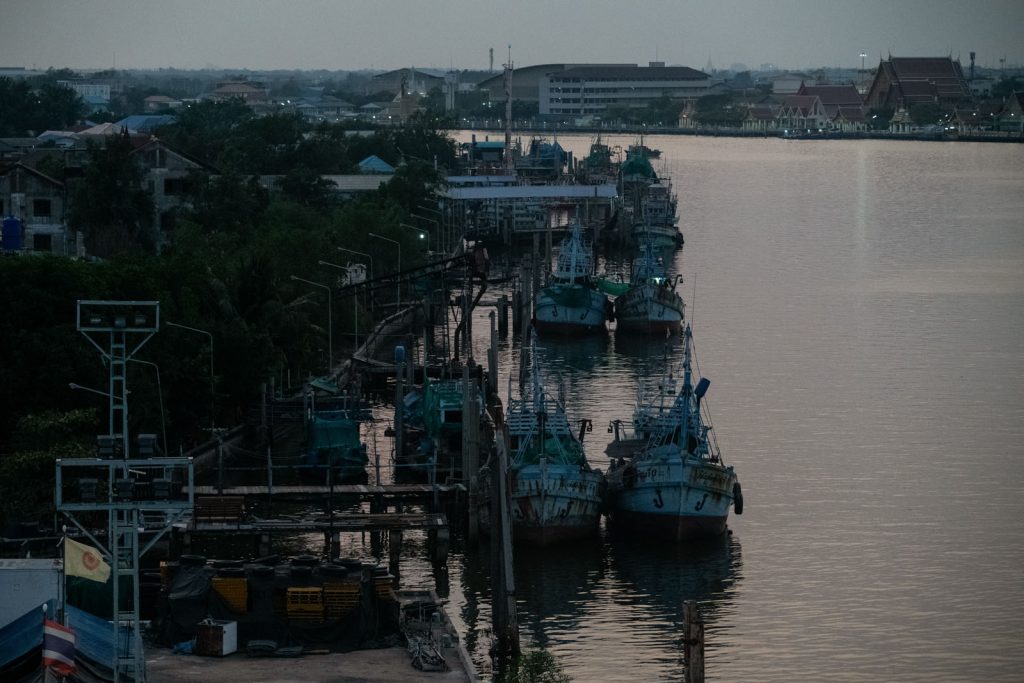
Learning from this success story, Mananshaya believes that telemedicine needs to be promoted as a new normal for migrant women to access abortion. The practice will not only overcome the travelling barrier but also reduce the cost for those already struggling to afford the procedure.
She also hopes that abortion upon request will be covered by health protections. One of the possibilities is to expand universal health care to cover non-Thais, as the National Health Security Office, which oversees the health scheme, sets the vision to provide service for “everyone who lives in Thailand.”
After her abortion, Ma Mi Mi enrolled in the relief programmes for unemployed housewives supported by Proud. She later decided she was ready for a new pregnancy. In early 2024, she gave birth to a baby boy.
“When everything gets into place, I want to go back to work,” said the migrant mother.
Nicha Wachpanich is a Bangkok-based journalist covering stories from a rights-based and human-interest perspective. She previously worked with a local environmental news agency under Thai Society of Environmental Journalists.
Shwe Paw Mya Tin is a freelance photojournalist from Myanmar. Her work has been featured in top international outlets like AFP, Reuters, and The Guardian. Currently living in Chiang Mai, she focuses on capturing the conflict in Myanmar, and the country’s exiled community.
*This story was commissioned and first published by hardstories.org


